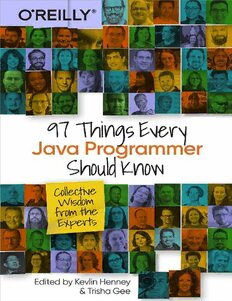
97 Things Every Java Programmer Should Know - Collective wisdom from the experts. PDF
Preview 97 Things Every Java Programmer Should Know - Collective wisdom from the experts.
1. Preface a. Permissions b. O’Reilly Online Learning c. How to Contact Us d. Acknowledgments 2. 1. All You Need Is Java a. Anders Norås 3. 2. Approval Testing a. Emily Bache 4. 3. Augment Javadoc with AsciiDoc a. James Elliott 5. 4. Be Aware of Your Container Surroundings a. David Delabassee 6. 5. Behavior Is “Easy”; State Is Hard a. Edson Yanaga 7. 6. Benchmarking Is Hard—JMH Helps a. Michael Hunger 8. 7. The Benefits of Codifying and Asserting Architectural Quality a. Daniel Bryant 9. 8. Break Problems and Tasks into Small Chunks a. Jeanne Boyarsky 10. 9. Build Diverse Teams a. Ixchel Ruiz 11. 10. Builds Don’t Have To Be Slow and Unreliable a. Jenn Strater 12. 11. “But It Works on My Machine!” a. Benjamin Muschko 13. 12. The Case Against Fat JARs a. Daniel Bryant 14. 13. The Code Restorer a. Abraham Marin-Perez 15. 14. Concurrency on the JVM a. Mario Fusco 16. 15. CountDownLatch—Friend or Foe? a. Alexey Soshin 17. 16. Declarative Expression Is the Path to Parallelism a. Russel Winder 18. 17. Deliver Better Software, Faster a. Burk Hufnagel 19. 18. Do You Know What Time It Is? a. Christin Gorman 20. 19. Don’t hIDE Your Tools a. Gail Ollis 21. 20. Don’t Vary Your Variables a. Steve Freeman i. Assign Once ii. Localize Scope 22. 21. Embrace SQL Thinking a. Dean Wampler 23. 22. Events Between Java Components a. A.Mahdy AbdelAziz 24. 23. Feedback Loops a. Liz Keogh 25. 24. Firing on All Engines a. Michael Hunger 26. 25. Follow the Boring Standards a. Adam Bien 27. 26. Frequent Releases Reduce Risk a. Chris O’Dell i. What Is Risk? ii. Large, Infrequent Releases Are Riskier 28. 27. From Puzzles to Products a. Jessica Kerr 29. 28. “Full-Stack Developer” Is a Mindset a. Maciej Walkowiak 30. 29. Garbage Collection Is Your Friend a. Holly Cummins 31. 30. Get Better at Naming Things a. Peter Hilton 32. 31. Hey Fred, Can You Pass Me the HashMap? a. Kirk Pepperdine 33. 32. How to Avoid Null a. Carlos Obregón i. Avoid Initializing Variables to Null ii. Avoid Returning Null iii. Avoid Passing and Receiving Null Parameters iv. Acceptable Nulls 34. 33. How to Crash Your JVM a. Thomas Ronzon 35. 34. Improving Repeatability and Auditability with Continuous Delivery a. Billy Korando i. Repeatable ii. Auditable 36. 35. In the Language Wars, Java Holds Its Own a. Jennifer Reif i. My History with Java ii. Java’s Design and Background iii. Java’s Downsides iv. Why I Like Java v. What Does It Mean for Developers? 37. 36. Inline Thinking a. Patricia Aas 38. 37. Interop with Kotlin a. Sebastiano Poggi 39. 38. It’s Done, But… a. Jeanne Boyarsky i. 1. Communication and Clarity ii. 2. Perception iii. 3. There’s No Partial Credit for Done 40. 39. Java Certifications: Touchstone in Technology a. Mala Gupta 41. 40. Java Is a ’90s Kid a. Ben Evans 42. 41. Java Programming from a JVM Performance Perspective a. Monica Beckwith i. Tip #1: Don’t Obsess Over Garbage ii. Tip #2: Characterize and Validate Your Benchmarks iii. Tip #3: Allocation Size and Rate Still Matter iv. Tip #4: An Adaptive JVM Is Your Right and You Should Demand It 43. 42. Java Should Feel Fun a. Holly Cummins 44. 43. Java’s Unspeakable Types a. Ben Evans 45. 44. The JVM Is a Multiparadigm Platform: Use This to Improve Your Programming a. Russel Winder 46. 45. Keep Your Finger on the Pulse a. Trisha Gee 47. 46. Kinds of Comments a. Nicolai Parlog i. Javadoc Comments for Contracts ii. Block Comments for Context iii. Line Comments for Weird Things iv. Last Words 48. 47. Know Thy flatMap a. Daniel Hinojosa 49. 48. Know Your Collections a. Nikhil Nanivadekar 50. 49. Kotlin Is a Thing a. Mike Dunn 51. 50. Learn Java Idioms and Cache in Your Brain a. Jeanne Boyarsky 52. 51. Learn to Kata and Kata to Learn a. Donald Raab 53. 52. Learn to Love Your Legacy Code a. Uberto Barbini 54. 53. Learn to Use New Java Features a. Gail C. Anderson 55. 54. Learn Your IDE to Reduce Cognitive Load a. Trisha Gee 56. 55. Let’s Make a Contract: The Art of Designing a Java API a. Mario Fusco 57. 56. Make Code Simple and Readable a. Emily Jiang 58. 57. Make Your Java Groovier a. Ken Kousen 59. 58. Minimal Constructors a. Steve Freeman 60. 59. Name the Date a. Kevlin Henney 61. 60. The Necessity of Industrial-Strength Technologies a. Paul W. Homer 62. 61. Only Build the Parts That Change and Reuse the Rest a. Jenn Strater 63. 62. Open Source Projects Aren’t Magic a. Jenn Strater 64. 63. Optional Is a Lawbreaking Monad but a Good Type a. Nicolai Parlog i. Monad Definition ii. Monad Laws iii. So What? 65. 64. Package-by-Feature with the Default Access Modifier a. Marco Beelen 66. 65. Production Is the Happiest Place on Earth a. Josh Long 67. 66. Program with GUTs a. Kevlin Henney 68. 67. Read OpenJDK Daily a. Heinz M. Kabutz 69. 68. Really Looking Under the Hood a. Rafael Benevides 70. 69. The Rebirth of Java a. Sander Mak 71. 70. Rediscover the JVM Through Clojure a. James Elliott 72. 71. Refactor Boolean Values to Enumerations a. Peter Hilton 73. 72. Refactoring Toward Speed-Reading a. Benjamin Muskalla 74. 73. Simple Value Objects a. Steve Freeman 75. 74. Take Care of Your Module Declarations a. Nicolai Parlog i. Keep Module Declarations Clean ii. Comment Module Declarations iii. Review Module Declarations 76. 75. Take Good Care of Your Dependencies a. Brian Vermeer i. Vulnerable Dependencies
